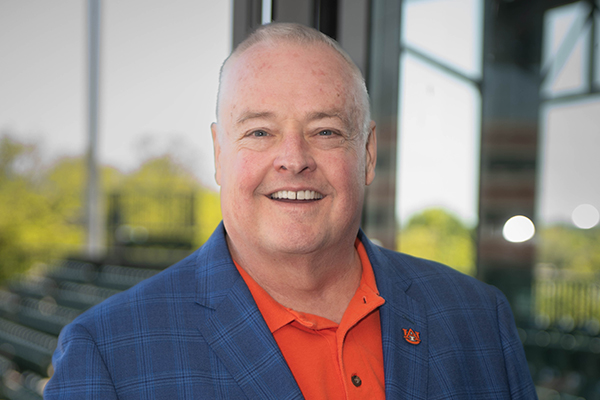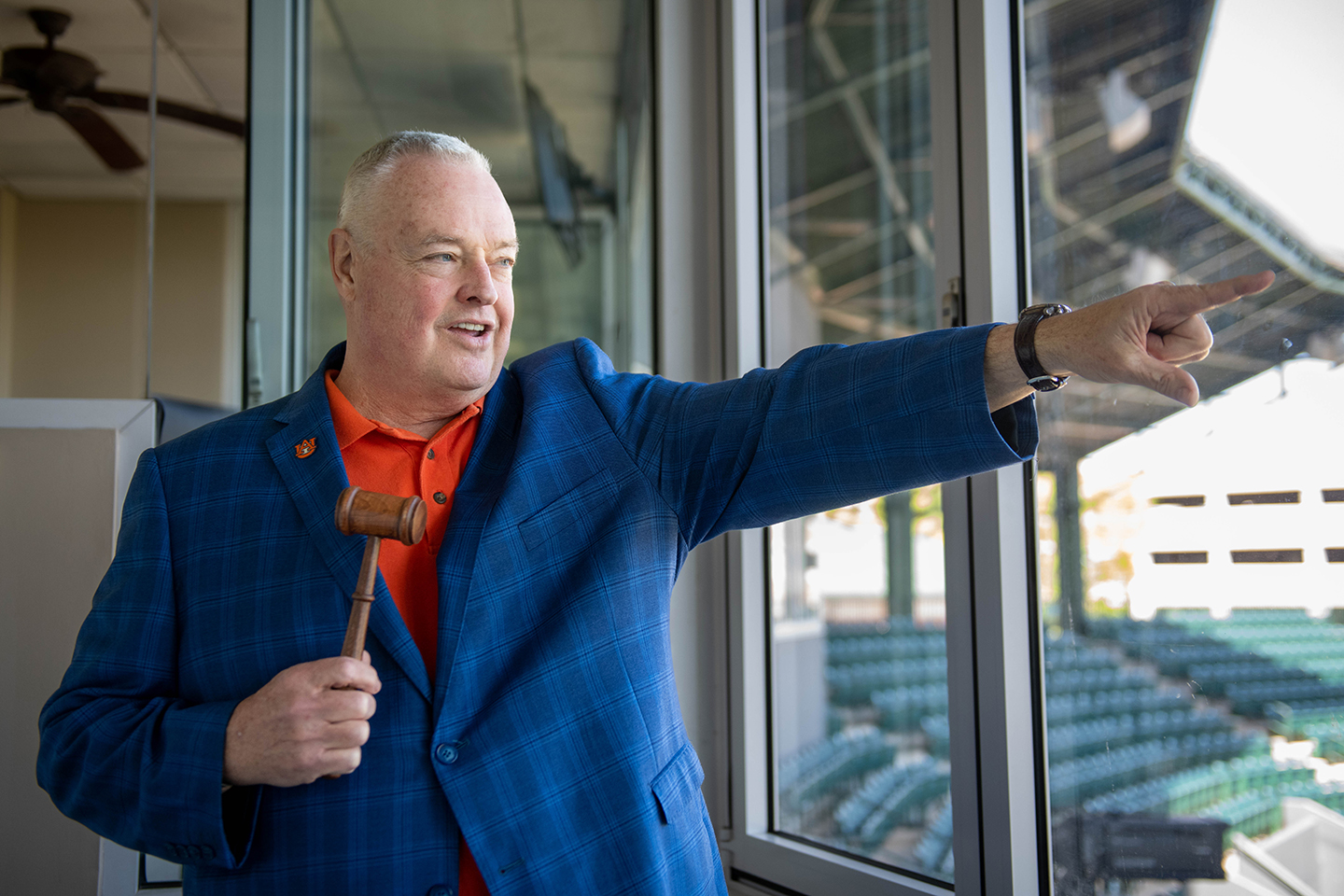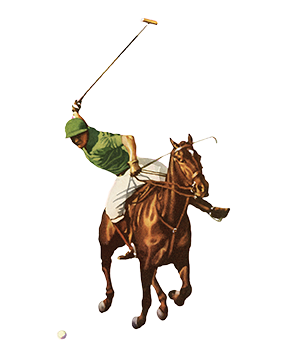From polo announcer to voiceover talent to auctioneer, one happenstance after another led Steve Lewandowski ’82 to careers using his voice.
By Kate Asbury Larkin ’21

It was all a fluke. Or maybe you could call it fate. Like, how Steve Lewandowski ’82 came about attending Auburn. How he literally got tricked into actually participating in a game of polo. How he spontaneously became a polo announcer and how that first match as an announcer resulted in a career of voiceovers. And, how announcing polo resulted in becoming a professional auctioneer. All a fluke. Every bit of it.
A native of Milwaukee, Wisc., Lewandowski attended Auburn in part because of (the late) Guy L. Burns ’27, who was a family friend. At Auburn, Lewandowski enrolled in the Navy ROTC program. About two hours after earning his degree in political science in 1982, he was commissioned in the United States Navy—the third generation of his family to serve—and was assigned to the Naval Amphibious Base (NAB) on Coronado Island in California. After his military stint, he stayed in Southern California, where he opened an insurance agency and established the Veterans Research Alliance (VRA), a nonprofit organization that raises money for veterans to fund smaller projects that would otherwise get caught up in the bureaucracy of getting approval.

A regulation polo field is 300 yards long by 160 yards wide, which is 10 acres, or nine football fields placed side by side.

In the 1930s, the United States cavalry used polo to maintain warfare skills. During that same time period, Auburn fielded a really good polo team.

“We (the VRA) are kind of like a special forces unit, getting projects funded quickly,” Lewandowski said. “There are veterans in our community who are better off—even still alive— because of the alliance, and that’s very rewarding.”
He began dating a girl, a third-generation polo player, who took Lewandowski horseback riding. Their path just happened to lead to a group of polo players who just happened to need another player.
“It was a complete set-up,” Lewandowski said. “We came up on this polo arena and she said, “oh look, they are one player short; they can’t practice unless they have another player.’ Then, you know, there was the perfect-size mallet hanging on the side of the fence and the next thing I knew, I was out there on a horse playing polo. I knew nothing about the sport and didn’t even realize what was happening.”
But that “set-up” was all it took. Lewandowski was hooked. He continued to play polo for fun as well as attend matches as a spectator and enjoyed learning more about the game. Less than a year after his introduction to the sport, the scheduled announcer for a match he was attending was also on the roster to play. So, even with his limited knowledge of the game, Lewandowski filled in as announcer. At the end of that competition, a talent agent walked up and handed her card to him.

“She asked me for a VO demo reel,” Lewandowski said. “I had no idea what a VO demo reel was.”
But he figured it out and sent the lady a voiceover demo tape, attended voiceover school and, over the past 30 years, has done more than a thousand voiceovers, both locally and nationally, for radio, television and Sony® Playstation.
Soon after that first, unexpected announcing gig, Lewandowski was contracted to serve as the voice of the San Diego Polo Club, where he announced for almost 30 years until the club closed in 2019. However, the end of the polo club was not the end of his announcing career. Lewandowski’s reputation was known internationally and has kept him very active in the business, announcing at polo events around the nation and abroad. For the past 31 years, he has called matches from coast to coast and around the world, including the Dublin Polo Club in Ireland, the World Cup in Mexico City, Mexico and for ESPN. At championship events, he can call as many as three matches per day.
“Oftentimes, younger announcers will call the early matches and I call the featured competitions at the event,” he said. “I still remember when I was one of those young announcers calling those first games.” Polo is an expensive sport to maintain. The cost of raising, training and traveling with the horses most often means the athletes who excel are from high-net-worth families. They are also traditionally very philanthropically engaged, with almost every player raising funds for a variety of charities. Since he was an announcer with a strong, clear speaking voice, Lewandowski was often asked to serve as an amateur auctioneer at their functions.
“I was just awful at first,” Lewandowski said. “But all of the big matches are tied to a charity fundraiser, so being an announcer and an auctioneer kind of fed off each other.” Lewandowski kept honing his auctioneering skills until he perfected that art as well as polo announcing. Now, more than 30 years later, his services are still very much in demand, with contracts to conduct around 35 charity auctions every year all around the country. His talent has helped raise millions of dollars for nonprofits.
Lewandowski said being a polo announcer is a relatively rare talent, but being a polo announcer who is also an auctioneer is even more unique.
“We could hold our polo announcer convention in a booth at Waffle House,” Lewandowski said. “But we could hold our polo announcer-auctioneer convention in a phonebooth.”
Veteran. Polo player. Polo announcer. Voiceover professional. Auctioneer. Auburn Man. And it all began as a fluke. Or fate.
At the halftime divot stomp: “Remember, if they’re still steaming, they’re probably not divots.”
“He’s/she’s as quick as a rattlesnake on amphetamines.”
When two players are pushing each other for the line of the ball: “It looks like they’re sharing the saddle.”
After a big shot down the field: “He/she sent the spheroid sailing skyward.”
When the ball goes far enough, but in the wrong direction: “He’s/she’s got plenty of sail, but not enough rudder.”
Hard hit: “He/she absolutely blistered that ball!”
When players are in scoring position: “Looks like he/she is on the dance floor.”
When a poor or misdirected shot is hit: “Looks like that’s not the shot he/she wanted.”
A great effort, but ultimately no good: “Son of a biscuit!”
When a player gets on the ball quickly: “He/she was on that ball like a hobo on a ham sandwich.”
“He’s/she’s tougher than a two dollar steak.”
On a shot that misses, especially an easy one: “The ball was obviously prevented from going in the goal because of the invisible electro-magnetic force field that is in effect.”
EXTRA, EXTRA, EXTRA!
Fun Facts
Four players on horses play on each team at an outdoor arena; three players on horses play at indoor events.
To not overwork the horses, generally riders change horses at the end of every chukker.
At halftime of each match, spectators participate in the Divot Stomp. They cover the field to replace the divots that have been created by the horses’ hooves. Lewandowski reminds those “if they are still steaming, they are probably not divots.”
Lewandowski calls a match as if the spectators are first-time attenders, because many of them are.
In the 1930s, the United States cavalry utilized polo to maintain warfare skills. During that same time period, Auburn fielded a really good polo team.

We Were CAPERS
From the 1960s to the 1980s, Auburn’s all-female military auxiliary instilled discipline and service, paving the way for future equality in the nation’s armed forces and preparing them for a lifetime of success.
The Antonio Network
Former Auburn football star Antonio Coleman ’08 returned to his old high school as head coach to turn the football program around. Through a unique group of local alumni, the team has started winning off the field, too.
Sharks, Sea Lions and Spreadsheets
Kristen Rosenberger ’10 keeps the National Aquarium swimming in the right direction.
We Were CAPERS
From the 1960s to the 1980s, Auburn’s all-female military auxiliary instilled discipline and service, paving the way for future equality in the nation’s armed forces and preparing them for a lifetime of success.
The Antonio Network
Former Auburn football star Antonio Coleman ’08 returned to his old high school as head coach to turn the football program around. Through a unique group of local alumni, the team has started winning off the field, too.
Sharks, Sea Lions and Spreadsheets
Kristen Rosenberger ’10 keeps the National Aquarium swimming in the right direction.


